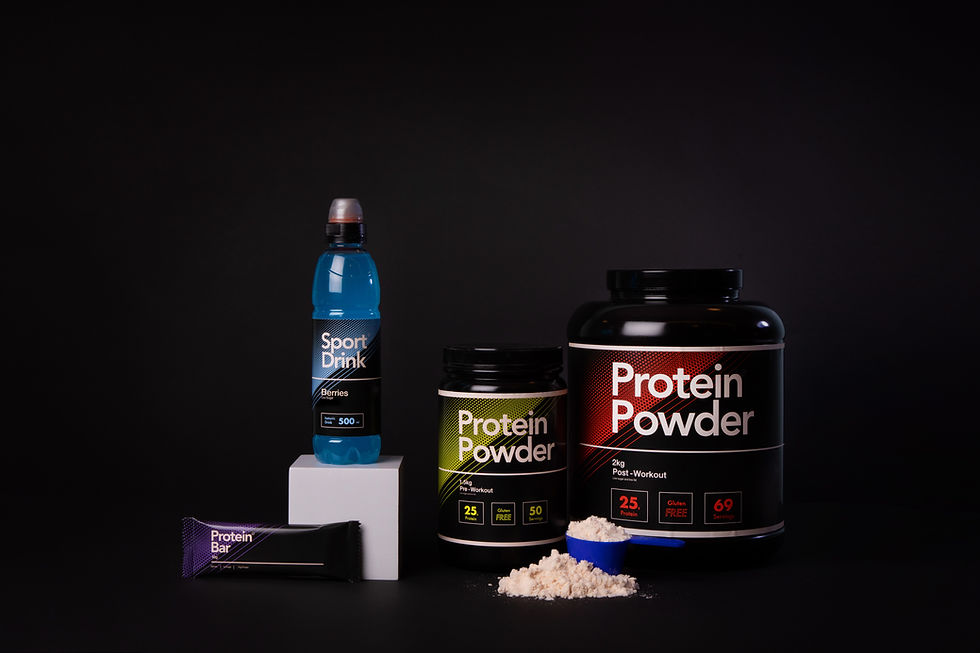Banned Supplements: The Pre-Workouts and Fat Burners You Should Avoid
- Jennifer Walker CPT-SNS-LBS-CHC

- Feb 13, 2025
- 4 min read
Updated: Feb 22, 2025

Keeping with the banned foods theme, we're looking at the supplement industry; which is like the Wild West—full of powerful claims, questionable ingredients, and, in some cases, outright dangerous substances. While many supplements can help boost performance or increase energy, some contain banned ingredients that have been linked to serious health risks, including heart attacks, liver damage, and even death.
1. DMAA (1,3-Dimethylamylamine) – The Banned Pre-Workout Stimulant
Banned by the FDA and WADA (World Anti-Doping Agency)
What it is: DMAA is a powerful stimulant once found in pre-workouts and fat burners like Jack3d and OxyElite Pro.
Why it’s banned: Linked to high blood pressure, heart attacks, and strokes, DMAA was officially banned by the FDA in 2013 after multiple deaths were linked to its use.
Hidden names: Methylhexanamine, Geranamine, 1,3-Dimethylamylamine.
Watch out for: Some companies still sneakily add DMAA under different names, so always check labels carefully.
2. Ephedrine – The Fat Burner That Got Too Dangerous
Banned by the FDA in dietary supplements but still legal in some medications
What it is: Ephedrine was once a staple in fat-burning pills and energy boosters. It’s a natural stimulant derived from the Ephedra plant.
Why it’s banned: It was linked to heart attacks, strokes, and even death—especially when combined with caffeine. After over 100 deaths, the FDA banned it in dietary supplements in 2004.
Hidden names: Ma Huang, Sida Cordifolia, Ephedra Extract.
Watch out for: Some supplements still claim to have "Ephedra-free ephedrine-like effects"—which is a big red flag.
3. SARMs (Selective Androgen Receptor Modulators) – The “Legal” Steroids
Banned by WADA and warned against by the FDA
What it is: SARMs are marketed as a "safe" alternative to steroids for muscle growth and fat loss, but they act like anabolic steroids in the body.
Why it’s banned: SARMs like Ostarine and Ligandrol have been linked to liver toxicity, heart problems, and hormone imbalances.
Hidden names: Ostarine (MK-2866), Ligandrol (LGD-4033), RAD-140, S4 (Andarine).
Watch out for: Many supplements labeled as "muscle-building research chemicals" or "not for human consumption" contain SARMs.
4. Yohimbine – The Risky Fat Burner
Legal in the U.S. but banned in Canada, Australia, and the UK
What it is: Yohimbine is a stimulant derived from the bark of the Yohimbe tree, used in fat burners and some male enhancement supplements.
Why it’s controversial: It can cause rapid heartbeat, high blood pressure, anxiety, and panic attacks—especially in high doses. Some users have reported extreme side effects like hallucinations and seizures.
Hidden names: Corynanthe Yohimbe, Pausinystalia Yohimbe.
Watch out for: Some fat burners don’t disclose the exact Yohimbine content, making it easy to overdose.
5. Synephrine (Bitter Orange) – The Ephedrine Replacement
Banned in certain European countries, still legal in the U.S.
What it is: Synephrine is a stimulant found in fat burners that replaced ephedrine after it was banned.
Why it’s controversial: It’s been linked to heart palpitations, high blood pressure, and fainting, especially when combined with caffeine.
Hidden names: Citrus Aurantium, Bitter Orange Extract, p-Synephrine.
Watch out for: Some products market it as a "natural fat burner", but the risks are similar to ephedrine.
6. Phenibut – The Anti-Anxiety Supplement That’s Highly Addictive
Banned in Australia, the UK, and some U.S. states
What it is: Originally developed in Russia as an anti-anxiety drug, Phenibut is now sold in the U.S. as a supplement for relaxation, sleep, and focus.
Why it’s banned: It acts like a sedative and can be highly addictive, leading to withdrawal symptoms similar to benzodiazepines (like Xanax).
Hidden names: β-Phenyl-γ-aminobutyric acid, Noofen.
Watch out for: Many nootropic supplements sneak Phenibut into their formulas without proper dosage warnings.
7. Aegeline – The Hidden Danger in Some Fat Burners
Banned by the FDA after causing liver damage
What it is: Aegeline is a synthetic compound that was used in fat burners like OxyElite Pro.
Why it’s banned: It was linked to severe liver failure, leading to hospitalizations and even deaths. The FDA banned it after an outbreak of liver toxicity cases in 2013.
Hidden names: N-Benzyl-α-Phenylethylamine, Bael Tree Extract.
Watch out for: Some sketchy supplement brands still use variations of this ingredient.
How to Protect Yourself from Dangerous Supplements
Many banned or dangerous supplements are still sold online or under different names, making it hard to tell what’s safe. Here’s how to stay protected:
✅ Check FDA warnings: The FDA regularly updates its tainted supplements list. Search for products before buying. ✅ Look for third-party testing: Buy from brands that use NSF Certified for Sport, Informed-Choice, or USP-certified products. ✅ Avoid sketchy marketing claims: If a supplement promises instant fat loss or crazy muscle gains, it’s likely too good to be true. ✅ Research the ingredients: Don’t trust the front label—check the full ingredient list for hidden stimulants or banned substances.
Final Thoughts: Are These Supplements Worth the Risk?
The supplement industry is filled with both helpful and harmful products, but banned substances are often dangerous for a reason. While some of these ingredients promise faster fat loss, more energy, or extreme muscle growth, the health risks far outweigh the benefits.
If you’re serious about fitness and health, stick to safe, well-researched supplements—and always do your homework before trying a new product.
Have you ever taken a supplement that caused unexpected side effects?





Comments